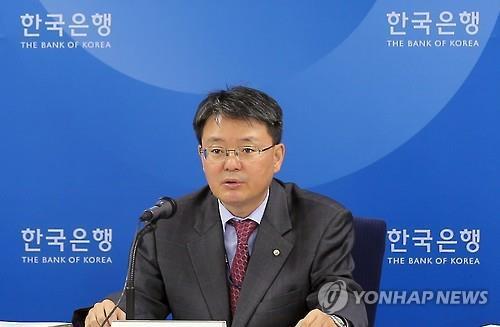The Bank of Korea on Thursday revised down its growth forecast from 2.8 percent to 2.7 percent this year, and kept its record low interest rate steady at 1.25 percent as expected, saying that its monetary policy was already accommodative enough to support the government’s planned fiscal stimulus.
The central bank’s rate policy decision was unanimous, and BOK Gov. Lee Ju-yeol sided with Finance Minister Yoo Il-ho on views that without monetary easing and fiscal stimulus, the country’s growth would fall to 2.5 percent.

But the chief monetary policymaker warned that Korea’s rising socioeconomic concerns, such as the low birth rate and rapidly aging population, would dampen productivity, hence growth in the future, hinting that Korea’s growth could slow further.
“Considering that the low birth rate and aging population are reducing productivity in a rapid pace, this could further cut the country’s growth potential,” Gov. Lee told reporters after its monetary policy meeting.
The central bank projects Korea to grow 2.6 percent in the first half of next year on expectations that the country would continue to “grow moderately.”
Along with a 0.1 percentage point drop in its 2016 growth forecast, the central bank also lowered its outlook for consumer prices increasing 1.1 percent from 1.2 percent this year. Its overall inflation target for 2016-2018 is 2 percent, down from 2.5 percent-3.5 percent for 2013-2015.
The inflation rate stood at 0.9 percent from January-June this year due to annual declines in international oil and raw materials prices. However, the central bank projects the inflation to reach near its 2 percent target next year as global trade improves and overcapacity in oil resources eases in coming months.
“The central bank’s lowering of its key base rate twice last year and once in June is expected to contribute to improving the economy, with the inflation rate reaching over 1 percent later this year and near 2 percent in the first half of next year,” BOK Gov. Lee said in a separate press briefing.
The BOK has also lent a hand to the government by agreeing to inject 12 trillion won both directly and indirectly via a fund into policy banks to finance the restructuring of debt-laden shipping and shipbuilding companies.
The BOK will provide 10 trillion won as a loan to the Industrial Bank of Korea, which will also additionally provide 1 trillion won to Korea Asset Management Corp. to recapitalize the Korea Development Bank and Export-Import Bank of Korea.
By Park Hyong-ki (
hkp@heraldcorp.com)








